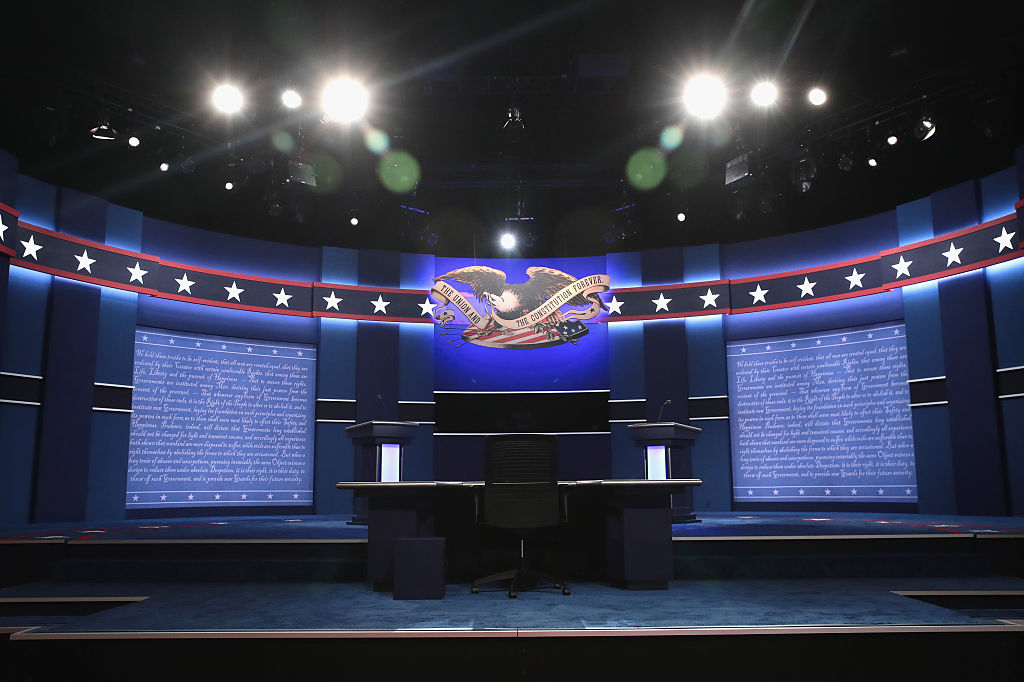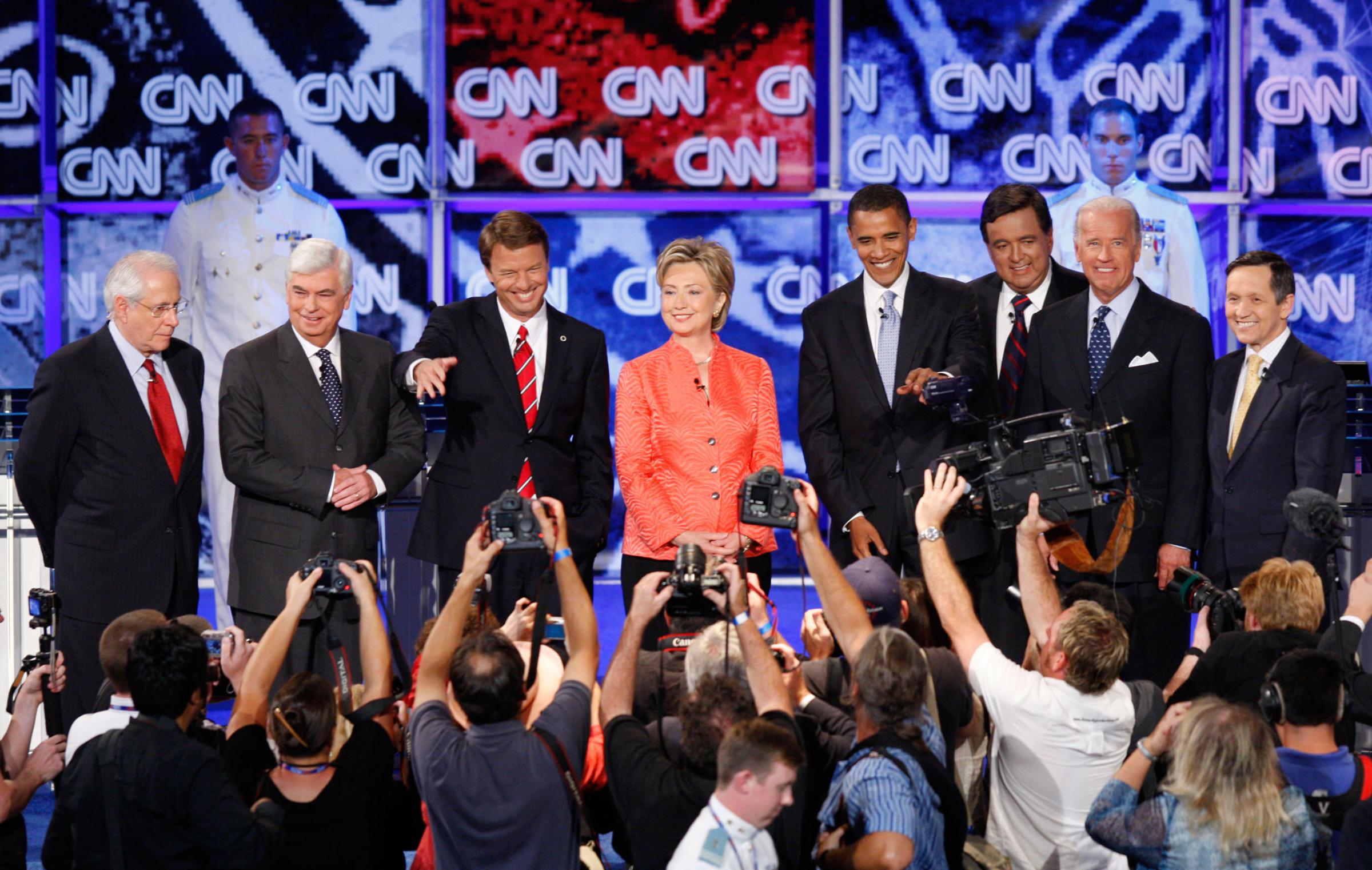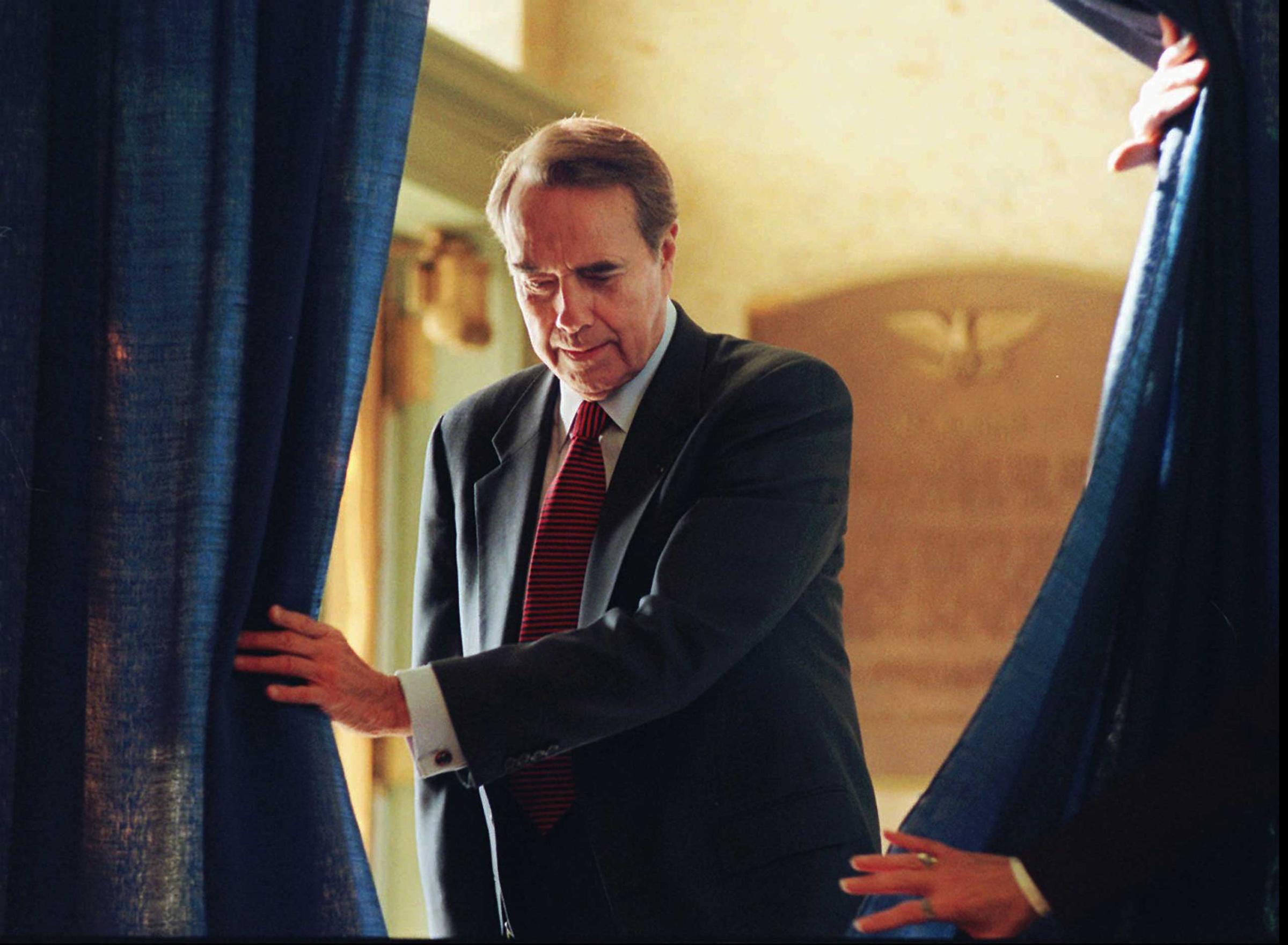
Debates can be defining moments for presidential candidates.
Since they provide rare opportunities for voters to see candidates face off directly against one another, debates can produce viral moments and soundbites that get replayed on cable news and social media.
In some cases, those moments can be devastating if they seem to confirm a pre-existing concern about a particular candidate, which will be especially relevant given the historically large 2020 field, most of whom will appear on a Democratic primary stage in Miami on June 26 or 27.
Kathleen Hall Jamieson, director of the public policy center at the University of Pennsylvania’s Annenberg School for Communication, says that debate flubs become important because they are repeated so much afterward.
“Largely, these moments have meaning because the press gives them meaning,” she said. “They don’t necessarily have meaning in their own right, because they tend to be short, and most of the public isn’t watching those debates anyway, so they live on in memory because the press has memorialized them and given them an interpretive frame.”
It’s possible to lose a debate and win the race — just ask Barack Obama, who is widely considered to have lost his first debate against Mitt Romney before going on to win re-election.
But as often as not, losing a debate is a sign you are losing the race.
Here are seven ways to lose a presidential debate.
Forget your own talking points
“Oops.” After then Texas Gov. Rick Perry struggled to name one of the three government agencies he wanted to dismantle, his 2012 campaign never recovered. Even before this flub, there were already questions about gravitas, and the gaffe only confirmed those expectations. “It’s pretty clear that that moment was, you know, pretty devastating for Rick Perry,” says Ben Warner, an associate professor of political communication at the University of Missouri.
Ironically, Perry now leads the Department of Energy — the Cabinet agency he forgot.
On the flip side, remember them too well
In a 2016 primary debate, Marco Rubio repeated a talking point four times, and then New Jersey Gov. Chris Christie called him out on it: “There it is, everybody. The 25-second memorized speech.”
That moment stood out “because a lot of people felt like it was a good embodiment of something they [already] didn’t like about Marco Rubio,” Warner says.
Rubio’s repetitive debate performance was costly to his campaign; three days later, he placed a disappointing fifth in New Hampshire.
Argue with the moderator, unsuccessfully
Because there will be 10 candidates on each stage in this year’s Democratic debates, this will be especially relevant as candidates compete for slivers of airtime. “Unlike a general election that the debate commission puts on, where there is equal time allotted to candidates to speak, that rule is not followed in primary debates,” explains Mitchell McKinney, a professor of political communication at the University of Missouri.
In the 2016 primary cycle, both Texas Sen. Ted Cruz and former Virginia Sen. Jim Webb haggled with debate moderators, to no avail.
But staking a claim to airtime can be a delicate balance. The candidates “have got to be able to stand their ground, but not belabor it, not make it the issue,” says Ruth Sherman, a strategic communications consultant.
Make a gaffe with racial undertones

In the third Democratic primary debate in June 2007, Delaware Sen. Joe Biden was responding to a question about the disproportionate rate of HIV/AIDS among African-American teenagers. Although he was onstage with seven other candidates, he added an odd aside that singled out one in particular. “I got tested for AIDS,” he said. “I know Barack got tested for AIDS.”
Here’s the Wall Street Journal’s account of the moment:
“The camera caught Illinois Sen. Barack Obama giving Biden a hard stare (although it seemed pretty mild compared to the glare Biden got from Al Sharpton, who was sitting in the audience).”
Coverage of that debate in the New York Times and the Los Angeles Times also noted the moment.
The future president responded to his eventual running mate by explaining that he had gotten tested to raise awareness. “I just got to make clear — I got tested with Michelle when we were in Kenya and Africa,” Obama said.
Get outplayed
When former CIA director George H.W. Bush showed up to the debate, he thought he would only be facing off against former California governor Ronald Reagan. But in a surprise move, Reagan — who had funded the debate — had invited the other four candidates, who awkwardly crowded around a stage that had been set for two.
The moderator tried to move ahead with only the top two candidates, and when Reagan tried to talk over him, the moderator said, “Will the sound man please turn Mr. Reagan’s mic off?”
Reagan stood up, and picked up the microphone. “I am paying for this microphone, Mr. Green,” he said, to applause from the audience. (The moderator’s last name was actually Breen, and some speculate that the former Hollywood actor was quoting from “State of the Union”, a 1948 movie starring Spencer Tracy and Katharine Hepburn.)
The four second-tier candidates “just looked like also-rans,” says Barbara Perry, the director of presidential studies at the University of Virginia’s Miller Center. And Reagan’s stunt “also made Bush 41 look that way, even though Bush had just scored an upset victory in the Iowa caucuses.” The former CIA director was “left just sitting there, stunned and looking like a deer caught in the headlights.”
After that debate, Perry says, Reagan’s campaign came “roaring back” to win the New Hampshire primary. Ultimately, Bush would lose the nomination to Reagan, then end up as his running mate.
Try too hard
In a February 2016 debate, Marco Rubio went after Donald Trump to try to give him a taste of his own medicine. Then, back on the trail, Rubio went even further.
The final nail in the coffin was when the senator infamously said that Trump has “small hands.”
In all, Rubio’s decision to “try to use Trump’s tactics against Trump is widely interpreted by the press as hurting Rubio rather than helping,” says Jamieson. Within a few weeks, Rubio dropped out of the race after losing the primary in his home state of Florida.
Back down from a challenge

In a 1988 Republican primary debate, former Delaware Gov. Pete DuPont challenged Minority Leader Bob Dole to sign a no-tax pledge. But the Kansas senator demurred.
“I never sign — I’d have to read it first,” Dole said, and tried to pass the hot potato to another opponent, George H.W. Bush. “Maybe George…”
Bush did sign, and his campaign manager Lee Atwater ran attack ads against Dole for failing to do so.
Dole finished second to Bush in the New Hampshire primary.
“The press interpretation of that was, ‘he won’t sign on to the no-tax pledge’,” Jamieson says. “When in fact, a reasonable interpretation of that was: an intelligent president doesn’t sign documents indiscriminately.”
But even as candidates try their hardest to score points onstage, it’s also important not to lose sight of the fact that making unfulfillable campaign promises may have long-term consequences. Later in that same election cycle, at the Republican National Convention, Bush uttered the fateful line “read my lips: no new taxes”, creating problems for himself down the road that ultimately may have cost him reelection.
As for Dole himself? In 1996, in another bid for the presidency, he finally did sign onto a no-tax pledge. And that year, he won the nomination.
More Must-Reads From TIME
- The 100 Most Influential People of 2024
- The Revolution of Yulia Navalnaya
- 6 Compliments That Land Every Time
- What's the Deal With the Bitcoin Halving?
- If You're Dating Right Now , You're Brave: Column
- The AI That Could Heal a Divided Internet
- Fallout Is a Brilliant Model for the Future of Video Game Adaptations
- Want Weekly Recs on What to Watch, Read, and More? Sign Up for Worth Your Time
Contact us at letters@time.com
